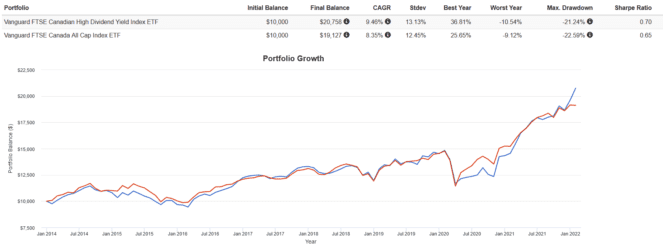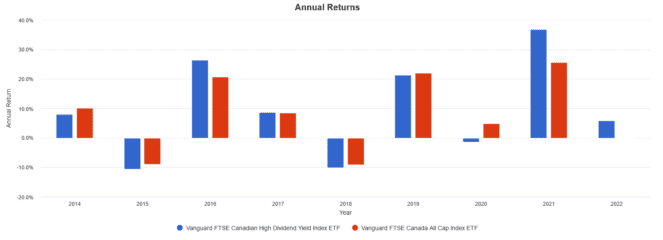Most Canadian investors maintain a home-country bias in their stock portfolios. This refers to the practice of over-weighting Canadian equities relative to their world market capitalization.
For example, although Canada comprises just 3% of the total world stock market, many Canadians keep an allocation of 20-50% to Canadian equities in their portfolio.
There are numerous benefits to implementing a moderate home country bias (20-30%), including lower volatility, reduced currency risk, and better tax efficiency.
Today, I’ll be going over two staple exchange-traded funds (ETFs) every Canadian investor should have as a foundation in their stock portfolio.
Vanguard FTSE Canadian High Dividend Yield Index ETF
Up first is a favourite for dividend-growth investors: Vanguard FTSE Canadian High Dividend Yield Index ETF (TSX:VDY). VDY passively tracks the performance of 39 Canadian stocks characterized by high dividend yields.
VDY is heavily weighted in the financials (58.7%) and energy (23.4%) sectors, which is expected given the plethora of high-dividend-paying stocks represented there. Overall, it resembles the broader Canadian market.
The top 10 holdings in VDY include Royal Bank, Toronto-Dominion Bank, Bank of Nova Scotia, Enbridge, Bank of Montreal, Canadian Natural Resources, Canadian Imperial Bank of Commerce, TC Energy, BCE, and Suncor Energy.
Currently, VDY costs a management expense ratio (MER) of 0.20% to hold, which is costlier than broad indexes but not expensive for a specialty fund. The 12-month dividend yield stands at a respectable 3.46%.
Vanguard FTSE Canada All Cap Index ETF
Investors looking for a passive indexing approach can elect to instead track the broad Canadian stock market with Vanguard FTSE Canada All Cap Index ETF (TSX:VCN). VCN tracks 182 of large-, mid-, and small-cap stocks.
VCN is still concentrated in the financials (35.1%) and energy (14.9%) sectors, but less so than VDY. There is a more balanced allocation to other sectors, such as materials, industrials, technology, utilities, and telecoms.
The top 10 holdings in VCN include Royal Bank, Toronto-Dominion Bank, Shopify, Bank of Nova Scotia, Enbridge, Brookfield Asset Management, Bank of Montreal, Canadian National Railway, Canadian Pacific Railway, and Canadian Natural Resources.
Currently, VCN costs a MER of just 0.05% to hold, which is extremely cheap and as affordable as it gets for Canadian investors. The 12-month dividend yield stands at a decent 2.50%.
Head-to-head performance
A word of caution: the backtest results provide below are hypothetical in nature, do not reflect actual investment results, and are not guarantees of future results. Hypothetical returns do not reflect trading costs, transaction fees, or actual taxes due on investment returns.
That being said, from 2014 to present, with all dividends reinvested, both funds are neck and neck. VDY had a higher return than VCN (CAGR of 9.46% vs. 8.35%) but also higher volatility (Stdev of 13.13% vs. 12.45%). Overall, drawdowns (-21.24% vs. -22.59%) and Sharpe ratios (0.70 vs. 0.65) were similar.


The Foolish takeaway
If I had to pick one to buy and hold until retirement, I would with VCN. The diversification benefits from owning the entire Canadian stock market and at a much lower MER makes it more attractive than VDY for me. VDY is too heavily concentrated in the financial and energy sectors, which are prone to cyclical underperformance.
Despite VDY’s higher dividend yield and total return, I would still opt for VCN. Controlling sources of risk like underdiversification and high fees go a long way towards boosting portfolio returns. That being said, if your goal is income, or you have reason to bet on a concentrated portfolio of blue-chip dividend stocks, VDY is the way to go.








